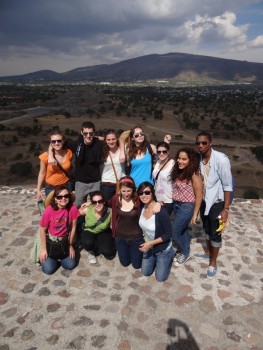Students Study Migration in Mexico City

The CPGC delegation at the top of the "Pyramid of the Sun" in the pre-Aztec ruins of Teotihuacan during a day off.
Details
Over winter break, for the third time in as many years, the Center for Peace and Global Citizenship (CPGC) sponsored a Mexico City migration-study tour. During the January trip, ten Haverford students heard presentations by local human rights activists and workers at non-governmental organizations to learn about migration in Mexico. Specifically, they looked at the phenomenon of Central Americans traveling through Mexico—many riding freight trains illegally and risking violence and abuse—to get the United States.
CPGC Interim International Program Coordinator Chloe Tucker '07 calls the migration route through Mexico one of the most dangerous paths in the world. "The violence is something that a lot of internationally minded NGOs engaged in human rights work are interested in," Tucker says.
Casa de los Amigos, a Mexico City-based Quaker organization that works with refugee resettlement and hospitality, was the CPGC's local partner, helping to organize the trip, make introductions to local activists and human rights workers, and provide a place for the CPGC delegation to stay.
One experience that made a big impact on the students was a visit to Casa de Migrante San Juan Diego, a small house (“no bigger than the CPGC café,” according to Tucker) near the train tracks frequented by those who train-hop their way across the thousands of miles from Central America to the U.S. border.
“This grounded what [the students] heard from presentations in reality,” says Tucker. Among the migrants they met was a mother with a six-month-old baby, a group of 20-year-olds and people with wounds they had suffered on the train tracks.
“To sit down and actually talk to migrants in Spanish about their experience just meant so much to me,” says Brian Rucker '14, one of the Fords on the trip.“Putting a face on an issue and just listening to people's personal struggles, hopes, aspirations, dreams and the ways in which they find happiness throughout the process was just amazing.”
Rucker was so inspired by that visit that he now plans to add a Spanish minor to his course of study. The trip also influenced the research proposal that he wrote as part of his application to the Mellon Mays Undergraduate Fellowship program, which recently accepted him. Rucker already has plans to return to Mexico on a CPGC grant this summer to continue his research into multicultural awareness in different countries.
“One thing that I really struggled with in this program was that it was only a week long,” he says.“We learned all about the problems of migration, the issues surrounding it, the killings, the murders, the robberies, the ransom holds, and then we just [returned to] Haverford. That made me feel helpless to some degree, because I had learned all these amazing things, but I didn't know what I could do as an American to help solve the problem. That's the reason I applied to go back this summer, because I'm more effective when I'm in Mexico doing the work.”
Also indelibly changed by the trip was Marla Dominguez '14, who grew up in the Bronx with parents who emigrated from the Dominican Republic. Dominguez was so eager to learn about other people's experiences with migration that this was the second year she applied to go on the CPGC tour. She, too, is now planning on declaring a Spanish minor (as well as a concentration in Latin American and Iberian Studies) and is another one of the students who will return to the Casa in Mexico City for a 10-week CPGC-sponsored internship this summer. (Tucker notes that this year everyone who was accepted for the summer program either applied for or attended the winter break trip.)
“I realized that I eventually want to work in an organization that helps immigrants and migrants, especially in the United States,” says Dominguez.“I feel like what I've learned [on this trip] helped me see all these difficult processes that people have to go through before they emigrate to the United States, and helped me put the classes I'm taking into context.”
“I think if Haverford is the site of a Center for Peace and Global Citizenship, then it's incumbent upon the Center and the College to look at what citizenship means and doesn't mean,” says the CPGC's Tucker.“Seeing people who are hungry for American citizenship is an incredibly powerful thing for people who may take that for granted. This trip is a very important way for us to accomplish our mission.”
-Rebecca Raber



